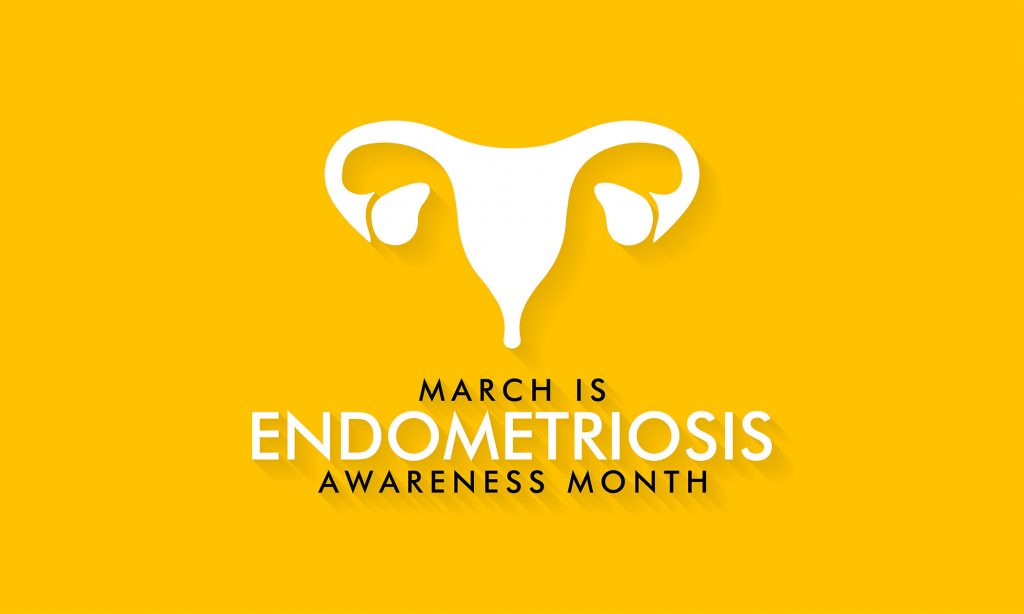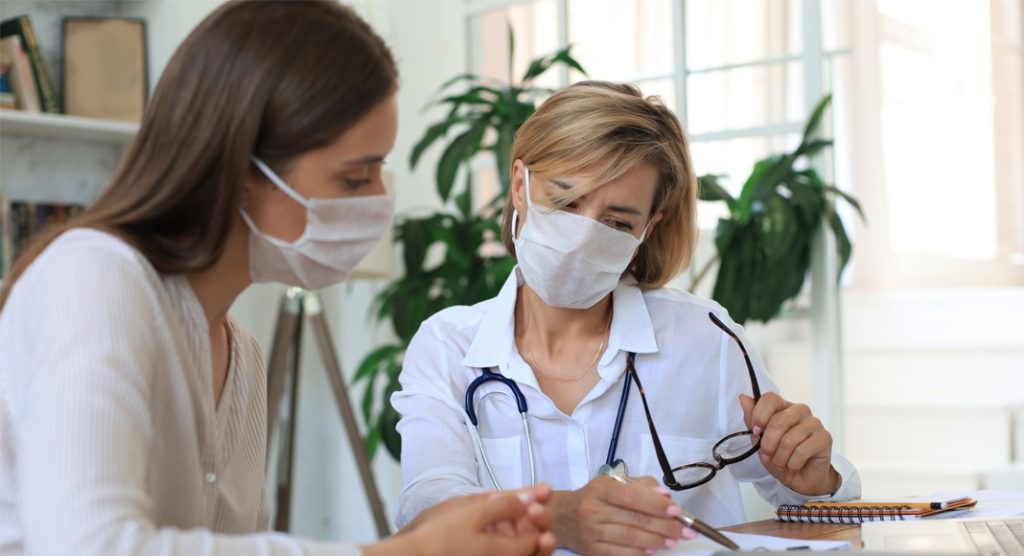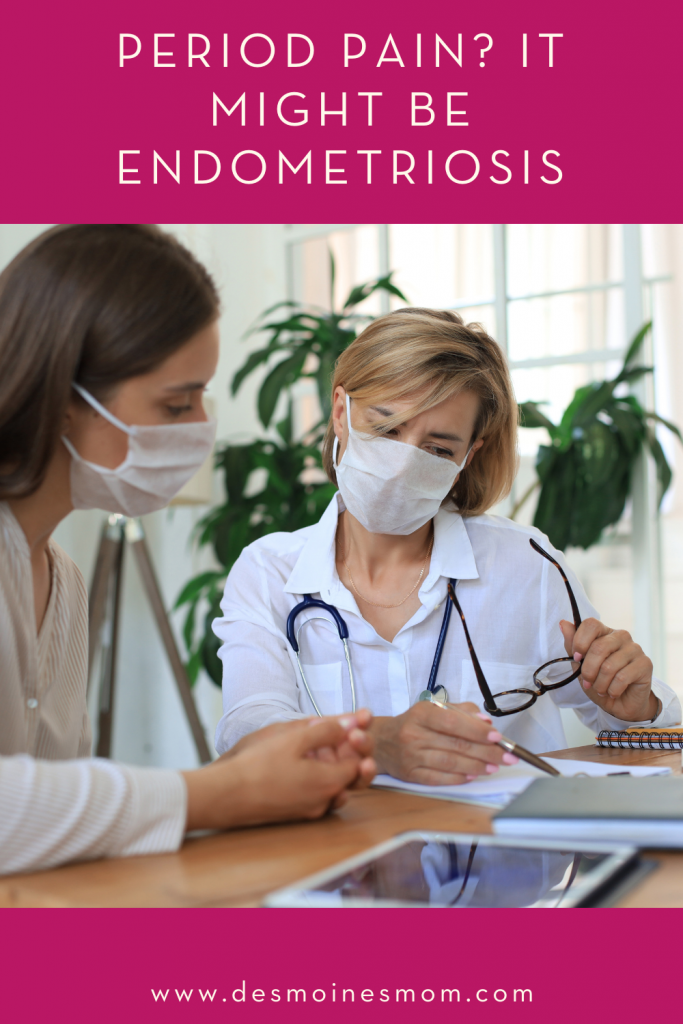
Let’s learn about endometriosis, a disorder which affects 1 in 10 women (about 200 million women worldwide) according to the U.S. Department of Health & Human Services.
What is endometriosis?
Endometriosis is a disorder where tissue like what is normally found inside the uterus- the endometrium- grows outside of the uterus. Endometriosis most commonly involves the ovaries, fallopian tubes, and tissues lining the pelvis. It is possible, however, for endometrial tissue to spread beyond pelvic organs.
What does endometriosis feel like?
Endometriosis is usually described as being painful, but not constant. It “flares” with the menstrual cycle. This is because that endometrial-like tissue that is outside of the uterus acts like the endometrial tissue in the uterus. It follows the menstrual cycle- it thickens, breaks down, and then bleeds with each cycle.
What causes endometriosis?
There is no clear answer to what causes endometriosis. One thought is endometriosis is caused by retrograde menstruation. This is when menstrual blood flows into the fallopian tubes and into the pelvic cavity instead of flowing into the vagina and out the body. The endometrial cells then stick to the pelvic walls and organs where they continue to follow a regular menstrual cycle.
Another thought looks at the induction theory, which proposes that hormones or other factors change abdominal cells (peritoneal cells) into endometrial-like cells.
Other theories look at endometrial cell transport by blood vessels or tissue fluids, an immune system disorder, or the attachment of endometrial cells to surgical incisions after a hysterectomy or cesarean delivery.
What are the common symptoms of endometriosis?
Common symptoms of endometriosis include:
- Painful periods- including pain before and after a menstrual period.
- Lower back and abdominal pain
- Pain during intercourse
- Painful bowel movements or urination- especially during a menstrual period
- Heavy menstrual bleeding or bleeding between periods
- Infertility
- Fatigue
- Diarrhea or constipation
- Bloating or nausea
What happens to fertility if a person has endometriosis?
A main complication of endometriosis is infertility. Approximately one-third to one-half of women diagnosed with endometriosis have difficulty getting pregnant. Endometriosis may obstruct the fallopian tube and keep the egg and sperm from coming together. Endometriosis may also damage sperm or eggs.
Even with mild to moderate endometriosis a person can still conceive and carry a pregnancy to term. It is possible a primary OB/GYN provider may refer a patient to fertility specialists to assist with conception.
How is endometriosis diagnosed?
To diagnosis endometriosis, your provider (be that your primary care provider, your gynecologist, or your midwife) will ask you to describe your symptoms, especially the location of the pain and when it happens.
Your provider may also recommend doing a pelvic exam, where the provider manually feels areas in your pelvis including your ovaries and uterus to assess for cysts and other abnormalities.
Tests such as ultrasound (abdominal or transvaginal) or an MRI may also be used to look for cysts (endometriomas) in your pelvis or abdomen.
In some cases, your provider may refer you to a surgeon for a procedure called laparoscopy. This is when a small incision is made to insert a laparoscope (like a small camera) to look for signs of endometrial tissue outside of the uterus.
 What is the treatment for endometriosis?
What is the treatment for endometriosis?
There are various treatment options for endometriosis. Before embarking on any treatment plan, it is important to discuss with your primary provider to choose a plan best for you.
- Pain Relief medicine: anti-inflammatory medicine like ibuprofen (Advil or Motrin), naproxen sodium (Aleve), or aspirin
- Hormone therapy: birth control pills, patches, etc. control the menstrual cycle and managing can result in a lighter and shorter menstrual flow which may reduce or even eliminate pain.
- Surgical procedure: There are various surgeries including the removal of endometrial tissues–to help relieve pain and improve fertility—or the removal of the uterus and possibly the ovaries.
Alternative/Complementary Therapies
There are some patients who have reported pain relief following an acupuncture treatment. There is little research available on any type of alternative treatments for endometriosis. If acupuncture is of interest, ask your provider if they are able to recommend a reputable acupuncturist.
Exercise, support groups, and fish oil supplements may also be options. As always, discuss any supplements with your provider to ensure there are no interactions with medications you may be taking.
When should I see a provider?
Any time you have concerns about your health it is a good time to see your provider. Find a MercyOne provider and learn more about women’s health.
Did you know you can see a certified nurse-midwife (CNMs) for concerns you have regarding your menstrual cycle? This includes pain, irregular bleeding, or other concerns. Did you also know that CNMs are also nurse practitioners? You can also see a midwife for all your well-woman needs and annual exams!
One of the most important things when choosing a provider is making sure you feel comfortable discussing personal aspects of your health with them and you feel comfortable working with them. MercyOne has multiple locations and experts for women’s health. MercyOne Des Moines Midwives and Comfort Health Center for Women, women of all ages have access to specialty care, complementary medicine, comprehensive risk assessments, and wellness information.
About the author: Emily Flahive, DNP, ARNP, CNM graduated from the University of  Minnesota in May of 2020 with a Doctorate in Nursing Practice degree with a specialty in Nurse-Midwifery. She decided to become a Certified Nurse Midwife to support women in their healthcare throughout their lifespan. She believes midwifery care is person- and family-centered care that supports the beliefs, cultures, traditions, religions, sexuality, and desires of the individual person while using best-practice standards to improve maternal mortality rates and women’s healthcare.
Minnesota in May of 2020 with a Doctorate in Nursing Practice degree with a specialty in Nurse-Midwifery. She decided to become a Certified Nurse Midwife to support women in their healthcare throughout their lifespan. She believes midwifery care is person- and family-centered care that supports the beliefs, cultures, traditions, religions, sexuality, and desires of the individual person while using best-practice standards to improve maternal mortality rates and women’s healthcare.
Connect with MercyOne Des Moines Medical Center
 Website: MercyOne.org/desmoines
Website: MercyOne.org/desmoines
Twitter: @MercyOneDSM
Facebook: @mercyonedesmoines
Instagram: @mercyonedesmoines
Pinterest: @MercyOneDesMoines
This article is part of a series of sponsored articles by MercyOne Des Moines Medical Center
Is it Perimenopause or Am I Going Crazy?!
MercyOne’s New Birthing Center
MercyOne Des Moines Midwives: Here to Support You

















